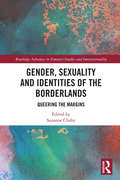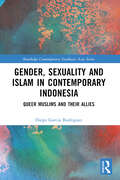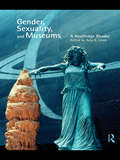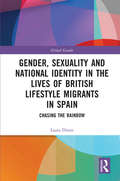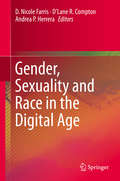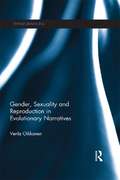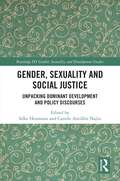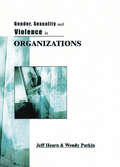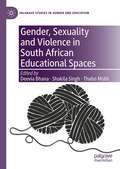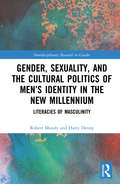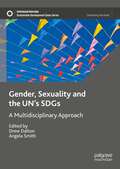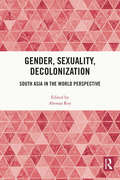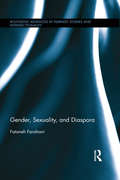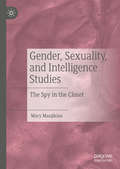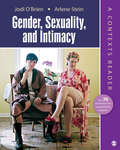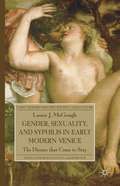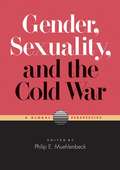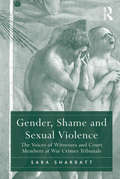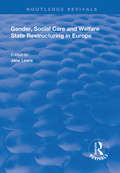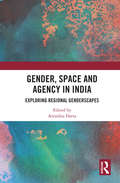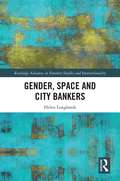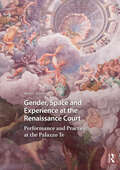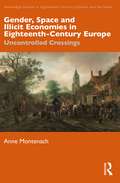- Table View
- List View
Gender, Sexuality and Identities of the Borderlands: Queering the Margins (Routledge Advances in Feminist Studies and Intersectionality)
by Suzanne ClisbyDrawing on border thinking, postcolonial and transnational feminisms, and queer theory, Gender, Sexuality and Identities of the Borderlands brings an intersectional feminist and queer lens to understandings of borderlands, liminality, and lives lived at the margins of socio-cultural and sexual normativities. Bringing together new and contemporary interdisciplinary research from across diverse global contexts, this collection explores the lived experiences of what Gloria Anzaldúa might have called ‘threshold people’, people who live among and in-between different worlds. While it is often challenging, difficult, and even dangerous, inhabiting marginal spaces, living at the borders of socio-cultural, religious, sexual, ethnic, or gendered norms can create possibilities for developing unique ways of seeing and understanding the worlds within which we live. This collection casts a spotlight on the margins, those ‘queer spaces’ in literary, cinematic, and cultural borderlands; postcolonial and transnational feminist perspectives on movement and migration; and critical analyses of liminal lives within and between socio-cultural borders. Each chapter within this unique book brings a critical insight into diverse global human experiences in the 21st Century.
Gender, Sexuality and Islam in Contemporary Indonesia: Queer Muslims and their Allies (Routledge Contemporary Southeast Asia Series)
by Diego Garcia RodriguezGender, Sexuality and Islam in Contemporary Indonesia explores gender, sexuality and religion in contemporary Indonesia. It is the first book-length analysis of the experiences of queer Muslims in Indonesia, the largest Muslim country and the world’s fourth most populous nation, as well as the first monograph exploring the voices of their allies vis-à-vis the role of Indonesian progressive Islam and Islam Nusantara. An ethnographic study based on semi-structured in-depth interviews, participant observation and media analysis, the book analyses how queer Indonesian Muslims come to, and navigate, their gender, sexual and religious subjectivities and subject positions, beliefs and practices. This is done by paying attention to their interactions with family, education, media, and peers. It also investigates the emergence of queer religious geographies through the case of an annual camp leading to alternative discussions on gender, sexuality, and religion impacting processes of subjectivity formation among participants. The author draws on recent scholarship that attends to ‘agency’ not merely as a synonym for resistance but also as a modality of action to examine the rise of queer religious agentic systems through the everyday practices of queer Muslims. Finally, the book explores the background of the allies of queer Muslims who have come to develop queer-inclusive strategies from within Islam by considering the processes that shaped their advocacy and the role of Islam Nusantara. The book reflects on the critical role of Islam for gender and sexual minorities in Indonesia. Presenting the voices, practices and activism of present-day Indonesians to explore the position of Islam as a source of emotional strength, guidance, and social support, this book will be of interest to researchers in the fields of Gender and Sexuality Studies, Religious Studies, Asian Studies and Southeast Asian Studies, Islamic Studies and Queer Anthropology.
Gender, Sexuality and Museums: A Routledge Reader
by Amy K. LevinGender, Sexuality and Museums provides the only repository of key articles, new essays and case studies for the important area of gender and sexuality in museums. It is the first reader to focus on LGBT issues and museums, and the first reader in nearly 15 years to collect articles which focus on women and museums. At last, students of museum studies, women’s studies, LGBT studies and museum professionals have a single resource. The book is organised into three thematic parts, each with its own introduction. Sections focus on women in museum work, applications of feminist and LGBT theories to museum exhibitions, exhibitions and collections pertaining to women and individuals who are LGBT. The Case studies in a fourth part provide different perspectives to key topics, such as memorials and memorializing; modernism and museums; and natural history collections. The collection concludes with a bibliographic essay evaluating scholarship to date on gender and sexuality in museums. Amy K. Levin brings together outstanding articles published in the past as well as new essays. The collection’s scope is international, with articles about US, Canadian, and European institutions. Gender, Sexuality and Museums: A Routledge Reader is an essential resource for those studying gender and sexuality in the museum.
Gender, Sexuality and National Identity in the Lives of British Lifestyle Migrants in Spain: Chasing the Rainbow (Global Gender)
by Laura DixonThis book takes an intimate look at the lives of British migrants in Sitges, an affluent coastal tourist town in Northern Spain and investigates ideas of gender, sexuality, and national identity as they are brought to life through the voices of British lifestyle migrants. Situating Sitges as a specifically affluent and "middle-class" location representing a particular form of "lifestyle migration," this rich and detailed study explores how the experiences of British migrants re-inscribe culturally specific understandings of the relationship between space, place, culture and identity. What ultimately emerges is an account of the complex structural constraints of identity, as British migrants find themselves stuck within the stereotype of badly-behaved Brits Abroad and entangled in highly conservative conceptualisations of gender and sexuality, that leave them unable to live the kind of cosmopolitan lifestyles that they so purposefully sought. This is a fascinating study suitable for researchers in gender and sexuality studies, tourism, sociology, and anthropology.
Gender, Sexuality and Race in the Digital Age
by D. Nicole Farris D’Lane R. Compton Andrea P. HerreraThis book provides a unique analysis of the intersection between gender, sexuality, race, and social media. While early scholarship identified the internet as being inherently egalitarian, this volume presents the internet as a “real” social place where inequalities matter and manifest in particular ways according to the architectures of particular platforms. This volume utilizes innovative methodologies to analyze how internet users both re-inscribe and resist inequalities of gender, sexuality, and race. It describes how the internet has ameliorated and bridged geographic and numerical limits on community formation, and this volume examines how the functioning of social inequalities differs on- and offline.
Gender, Sexuality and Reproduction in Evolutionary Narratives (Transformations)
by Venla OikkonenSince the early 1990s, evolutionary psychology has produced widely popular visions of modern men and women as driven by their prehistoric genes. In Gender, Sexuality and Reproduction in Evolutionary Narratives, Venla Oikkonen explores the rhetorical appeal of evolutionary psychology by viewing it as part of the Darwinian narrative tradition. Refusing to start from the position of dismissing evolutionary psychology as reactionary or scientifically invalid, the book examines evolutionary psychologists’ investments in such contested concepts as teleology and variation. The book traces the emergence of evolutionary psychological narratives of gender, sexuality and reproduction, encompassing: Charles Darwin’s understanding of transformation and sexual difference Edward O. Wilson’s evolutionary mythology and the evolution-creationism controversy Richard Dawkins’ molecular agency and new imaging technologies the connections between adultery, infertility and homosexuality in adaptationist thought. Through popular, literary and scientific texts, the book identifies both the imaginative potential and the structural weaknesses in evolutionary narratives, opening them up for feminist and queer revision. This book will be of interest to students and scholars of the humanities and social sciences, particularly in gender studies, cultural studies, literature, sexualities, and science and technology studies.
Gender, Sexuality and Social Justice: Unpacking Dominant Development and Policy Discourses (Routledge ISS Gender, Sexuality and Development Studies)
by Silke Heumann Camilo Antillón NajlisThis book addresses the intersections of gender, sexuality and social justice in relation to dominant development and policy discourses and interventions. Bringing together young scholars from Latin America, Africa and Asia, the book challenges dominant assumptions on sexuality in development discourse, policy and practice and proposes alternative approaches. Reflecting on both the ‘global north’ and the ‘global south’, this book investigates key social justice issues, from teenage pregnancy, child marriage discourses, sexual empowerment, to sexual diversity, female imprisonment and sexuality, militarism and sexuality, anti-trafficking policies and processes of racialization and othering in the context of migration. Overall, the book challenges binary constructs and argues for an intersectional perspective on gender and sexual diversity as a problem of structural inequality that interacts with other systems of inequality, based on race, age, class and geopolitics. This book will be of interest to social scientists and activists, as well as development scholars and practitioners engaging with questions of gender, sexuality and social justice.
Gender, Sexuality and Violence in Organizations: The Unspoken Forces of Organization Violations
by Jeff Hearn Wendy Parkin`This exceptionally interesting study provides an up-to-date and integrated perspective on organizations, violence, gender and sexuality. It pays particular attention to the power wielded by hierarchies of heterosexual men, and the ways in which this produces violence in different, carefully analyzed forms. This book is a major contribution to the construction of sociological and political knowledge that is not founded on the dominant definitions of heterosexual masculinities' - Professor Terrell Carver, University of Bristol `This is a wide-ranging and authoritative book. The authors draw attention to the huge amount of evidence now available that documents the gendering and sexualising processes at the core of organisational life. While they never nag about violation and inequality, they are nonetheless relentless in confronting the reader with the weight of evidence'- Professor Rosemary Pringle, University of Southampton This book brings together the themes of gender, sexuality, violence and organizations. The authors synthesize the literature and research which has been done in these fields and provide a coherent framework for understanding the interrelationship between these concepts. The importance of violence and abuse, and particularly men's violence to women, children and other men has been well established, especially through feminist and some pro-feminist research. The insights of this scholarship have rarely been applied to organizational analysis. The authors draw on this literature and their own research, as well as relevant literatures on safety and risk at work; anxiety and stress at work; organizational policies on violence; sexual harassment and bullying in organizations; and male sexuality, to provide valuable information on violence in and around organizations. Gender, Sexuality and Violence in Organizations breaks new ground in organization studies and will be essential reading for academics and students in both organization studies and all those studying issues of gender and sexuality in organizations.
Gender, Sexuality and Violence in South African Educational Spaces (Palgrave Studies in Gender and Education)
by Deevia Bhana Thabo Msibi Shakila SinghThe book focuses on the ways in which gendered and sexualised systems of power are produced in educational settings that are framed by broader social and cultural processes, both of which shape and are shaped by children and young people as they interact with each other. All these nuanced features of gender and sexuality are vital if we are to understand inequalities and violence, and fundamental to our three-ply yarn approach in this book. Focusing on the South African context, but with international relevance, the authors adopt the metaphor of the three-ply yarn (Jordan-Young, 2010): these being the cross-cutting themes of gender, sexuality and violence. Subsequently, the book illustrates the intimate ties that bind gender and sexuality with the social and cultural dimensions of violence, as experienced in educational settings.
Gender, Sexuality and the Cultural Politics of Men’s Identity in the New Millennium: Literacies of Masculinity (Interdisciplinary Research in Gender)
by Robert Mundy Harry DennyThis book considers mass media and contemporary cultural trends to examine masculinity at a point of unprecedented change. While sexual and gender politics have always been fraught, the long unexamined privilege associated with masculinity is now subject to intense scrutiny marked by a host of complex factors. As past markers of masculine norms have been challenged on cultural, social, and economic fronts, men occupy public space ever aware that how they interact with others is questioned and questionable. What does manhood mean? Who is included in its dominant formations? What performances signify membership in the club? How are men reading this contemporary moment and to what extent does cultural literacy inform, maintain, or challenge normative male identities and subsequent performances? This work examines such questions through language and symbolic meaning, and challenges its readers to critically examine what men know and how they understand and embody gender and sexuality in a post-millennial society. Gender, Sexuality, and the Cultural Politics of Men’s Identity in the New Millennium: Literacies of Masculinity crosses academic disciplines and will be highly relevant in composition/rhetoric, gender studies, masculinity studies, and cross-curricular courses that take up popular/contemporary culture as well as gender, sexuality, race, and class. It has been designed with both undergraduate and graduate students in mind.
Gender, Sexuality and the UN's SDGs: A Multidisciplinary Approach (Sustainable Development Goals Series)
by Angela Smith Drew DaltonAgainst the backdrop of Covid-19, this edited volume will utilize a gendered lens to explore the United Nation’s Sustainable Development Goals (SDGs), with a clear focus on challenging the omission of sexuality in relation to the SDGs as well as analyzing the ways in which the SDGs are also equally relevant for Western countries. While acknowledging the importance of these goals, contributors unpack the exclusion of marginalized genders and sexualities as well as how popular media and social media contribute to the wider understanding of issues of gender and sexuality and the SDGs. This volume also dispels assumptions about the irrelevance of SDGs to countries in the West, with a particular focus on the UK. Chapters examine a variety of topics including: HIV/AIDS, sex work, global migration, climate change and environmental sustainability, poverty, education, and sexual harassment. This collection will be of interest to scholars, researchers, and students across Sociology, Gender & Sexuality Studies, Education, Development Studies and Sustainability Studies.
Gender, Sexuality, Decolonization: South Asia in the World Perspective
by Ahonaa RoyThis book presents a new approach to the understanding of non-normative sexuality and gender transgressive modes in South Asia and South Asian diaspora. It reconceives sexual representation from the point of view of the theoretical, political and empirical trajectories of decolonization, provincialization and neoliberalism to look at the role of historical contingency, postcolonial sexual politics and gender and sexual diversity. The volume brings together anthropological, historical, material and political analyses around South Asian sexual politics by exploring a range of themes, including culture, class, ethnicity, identity, intersectionality, migration, borders, diaspora, modernity and cosmopolitanism across various local, regional and global contexts. By using southern/non-Western and subaltern theorizations of gender and sexuality, the book discusses South Asian sexualities through issues such as the sexual politics of indeterminacy; sexual subculture, iconography and political decision-making; religious identity; queer South Asian diaspora; decolonizing the postcolonial body; sexual politics, gender and feminist debates; discrimination, and socio-political violence; the political economy of empowerment; and critical appropriation of the 377 Indian Penal Code. It also builds forms of dialogues to bridge the gap between academic and development practitioners. With diverse case studies and a fresh theoretical framework, this book will be an essential read for scholars and researchers of South Asian studies, gender studies, sexuality studies, sociology and social anthropology, political studies, diaspora studies, postcolonial and global south studies.
Gender, Sexuality, and Diaspora (Routledge Advances in Feminist Studies and Intersectionality)
by Fataneh FarahaniTo what extent do women accept, adjust and challenge the intersecting and shifting relations of cultural, political and religious discourses that organize their (sexual) lives? Seeking to expand the focus on changing gender roles and construction of diasporic femininities and sexualities in migration studies, Farahani presents an original analysis of first generation Iranian immigrant women in Sweden. Certainly, highlighting the hybrid experiences of Swedish Iranians, Farahani explores the tensions that develop between the process of (self)disciplining women’s bodies and the coping tactics that women employ. Subsequently, Gender, Sexuality, and Diaspora demonstrates how migratory experiences impact sexuality and, conversely, how sexuality is constitutive of migratory processes. A timely book rich with empirical and theoretical insights on the subject of gender, diaspora and sexuality, it will appeal to scholars and undergraduate and postgraduate students of gender studies, anthropology, sociology, sexuality studies, diaspora, postcolonial and Middle Eastern studies.
Gender, Sexuality, and Intelligence Studies: The Spy in the Closet
by Mary ManjikianThis is the first work to engage with intelligence studies through the lens of queer theory. Adding to the literature in critical intelligence studies and critical international relations theory, this work considers the ways in which both the spy, and the activities of espionage can be viewed as queer. Part One argues that the spy plays a role which represents a third path between the hard power of the military and the soft power of diplomacy. Part Two shows how the intelligence community plays a key role in enabling leaders of democracies to conduct covert activities running counter to that mission and ideology, in this way allowing a leader to have two foreign policies—an overt, public policy and a second, closeted, queer foreign policy.
Gender, Sexuality, and Intimacy: A Contexts Reader
by Jodi O'Brien Professor Arlene J. SteinThis new anthology brings together over 90 recent readings on gender, sexuality, and intimate relationships from Contexts, the award-winning magazine published by the ASA. Each contributor is a contemporary sociologist writing in the clear, concise, and jargon-free style that has made Contexts the “public face” of sociology. The editors have chosen pieces that are timely, thought-provoking, and especially suitable for classroom use; written introductions that frame each of the books three main sections; and provided questions for discussion.
Gender, Sexuality, and Intimacy: A Contexts Reader
by Jodi O'Brien Professor Arlene J. SteinThis new anthology brings together over 90 recent readings on gender, sexuality, and intimate relationships from Contexts, the award-winning magazine published by the ASA. Each contributor is a contemporary sociologist writing in the clear, concise, and jargon-free style that has made Contexts the “public face” of sociology. The editors have chosen pieces that are timely, thought-provoking, and especially suitable for classroom use; written introductions that frame each of the books three main sections; and provided questions for discussion.
Gender, Sexuality, and Syphilis in Early Modern Venice
by Laura J. McgoughA unique study of how syphilis, better known as the French disease in the sixteenth and seventeenth centuries, became so widespread and embedded in the society, culture and institutions of early modern Venice due to the pattern of sexual relations that developed from restrictive marital customs, widespread migration and male privilege.
Gender, Sexuality, and the Cold War: A Global Perspective
by Philip E. MuehlenbeckAs Marko Dumančić writes in his introduction to Gender, Sexuality, and the Cold War, "despite the centrality of gender and sexuality in human relations, their scholarly study has played a secondary role in the history of the Cold War. . . . It is not an exaggeration to say that few were left unaffected by Cold War gender politics; even those who were in charge of producing, disseminating, and enforcing cultural norms were called on to live by the gender and sexuality models into which they breathed life." This underscores the importance of this volume, as here scholars tackle issues ranging from depictions of masculinity during the all-consuming space race, to the vibrant activism of Indian peasant women during this period, to the policing of sexuality inside the militaries of the world.Gender, Sexuality, and the Cold War brings together a diverse group of scholars whose combined research spans fifteen countries across five continents, claiming a place as the first volume to examine how issues of gender and sexuality impacted both the domestic and foreign policies of states, far beyond the borders of the United States, during the tumult of the Cold War.
Gender, Sexuality, and the Cold War: A Global Perspective
by Philip E. MuehlenbeckAs Marko Dumančić writes in his introduction to Gender, Sexuality, and the Cold War, "despite the centrality of gender and sexuality in human relations, their scholarly study has played a secondary role in the history of the Cold War. . . . It is not an exaggeration to say that few were left unaffected by Cold War gender politics; even those who were in charge of producing, disseminating, and enforcing cultural norms were called on to live by the gender and sexuality models into which they breathed life." This underscores the importance of this volume, as here scholars tackle issues ranging from depictions of masculinity during the all-consuming space race, to the vibrant activism of Indian peasant women during this period, to the policing of sexuality inside the militaries of the world.Gender, Sexuality, and the Cold War brings together a diverse group of scholars whose combined research spans fifteen countries across five continents, claiming a place as the first volume to examine how issues of gender and sexuality impacted both the domestic and foreign policies of states, far beyond the borders of the United States, during the tumult of the Cold War.Table of ContentsPrefaceIntroduction: Hidden in Plain Sight: The Histories of Gender and Sexuality during the Cold War Marko Dumančić Part I: SexualityFaceless and Stateless: French Occupation Policy toward Women and Children in Postwar Germany (1945-1949) Katherine RossyPatriarchy and Segregation: Policing Sexuality in US-Icelandic Military Relations Valur IngimundarsonQueering Subversives in Cold War Canada Patrizia Gentile"Nonreligious Activities": Sex, Anticommunism, and Progressive Christianity in Late Cold War Brazil Benjamin A. CowanManning the Enemy: US Perspectives on International Birthrates during the Cold War Kathleen A. Tobin Part II: FemininitiesIndian Peasant Women's Activism in a Hot Cold War Elisabeth ArmstrongThe Medicalization of Childhood in Mexico during the Early Cold War, 1945-1960 Nichole SandersAfrica's Kitchen Debate: Ghanaian Domestic Space in the Age of the Cold War Jeffrey S. AhlmanMobilizing Women? State Feminisms in Communist Czechoslovakia and Socialist Egypt May Hawas and Philip E. MuehlenbeckA Vietnamese Woman Directs the War Story: Duc Hoan, 1937-2003 Karen TurnerGlobal Feminism and Cold War Paradigms: Women's International NGOs and the United Nations, 1970-1985 Karen Garner Part III: Masculinities"Men of the World" or "Uniformed Boys"? Hegemonic Masculinity and the British Army in the Era of the Korean War Grace HuxfordYuri Gagarin and Celebrity Masculinity in Soviet Culture Erica L. Fraser
Gender, Shame and Sexual Violence: The Voices of Witnesses and Court Members at War Crimes Tribunals
by Sara SharrattDrawing on extensive interview material gathered amongst victims, witnesses, judges and NGOs, this book investigates the prosecution of rape and sexual violence in war crimes tribunals, with special attention to The International Court for the Former Yugoslavia (ICTY) and World Court in Sarajevo. It examines the testimonies of victims and witnesses and their reasons for testifying, their attitudes towards perpetrators, the consequences of testifying, their recommendations for other witnesses and conceptions of justice. In addition, it explores the attitudes of judges, prosecutors, psychologists and those in charge of protecting and offering services. Adopting a feminist approach, ’Gender, Shame and Sexual Violence’ challenges the assumption that the deterrent effect of making rape trials more visible would reduce the occurrence of sexual violence in conflict situations, contending instead that the manner in which cases are handled both increases the victims’ sense of shame and serves to propagate a representation of women's bodies that may actually serve to increase the use of sexual violence during war. A compelling analysis of the prosecution of rape as a war crime, this volume offers extensive new empirical material that will be of interest to scholars of sociology, gender studies, criminology, politics, international relations and law.
Gender, Social Care and Welfare State Restructuring in Europe (Routledge Revivals)
by Jane LewisPublished in 1998. Social provision in all European countries has faced increasing scrutiny during the 1990s. Focusing on gendered aspects of welfare state restructuring, each contributor examines the way in which the welfare state of his or her country has been restructed over the past decade, concentrating on services for elderly people and for children. Each chapter outlines the shifts in the mixed economy of welfare and describes the degree to which there has been greater decentralization moves towards a different style of public management or the introduction of market principles. The changes in the provision of services for elderly people and children is described for the same period. Finally, women's position as paid providers of services, as unpaid carers and as recipients of services is analyzed. This book investigates the idea that the move towards "marketization" in many countries is having a disproportionately detrimental effect on women whose leverage on the market tends to be weak.
Gender, Space and Agency in India: Exploring Regional Genderscapes
by Anindita DattaThis volume explores the links between gender, space and agency in India. It offers fresh perspectives and frameworks within which these links can be analysed across diverse geographical contexts in India. The essays in this volume are based on field studies which showcase how agency is gendered. It examines how gender and agency are fashioned by a multitude of everyday contexts, socio-economic processes, policy interventions, and geographic phenomenon, and manifest in — diffusion of education, decentralisation of politics, rising social inequalities, poverty, green revolution, mechanisation of agriculture, and even drought. This book will be of interest to researchers, teachers and practitioners of human geography, social and cultural geography, and those interested in geographies of gender. It will also be helpful for policy makers interested in the issues of gender and development in India.
Gender, Space and City Bankers (Routledge Advances in Feminist Studies and Intersectionality)
by Helen LonglandsGendered processes of globalisation, transnationalisation and urbanisation are increasing local and global inequalities and widening the gap between the rich and the poor. The global finance industry plays a key role in these processes, directing its operations from local command points in global cities such as London. Drawing on empirical data collected after the 2008 financial crisis – in depth interviews with male City of London bankers who are also fathers, in depth interviews with the bankers’ wives, observational data of work and family spaces, and banks’ promotional online material –this book explores the day-to-day individual and institutional social practices of wealthy City bankers and banks. The book’s analysis offers insight into how the spaces of work and home are integrally linked in ways that mutually shape, support and sustain the gendered dominance of the industry and its highly paid workers. This book will appeal to postgraduate students, researchers and academics interested in the fields of gender studies, critical studies of men and masculinities, urban and metropolitan studies, sociology, studies of globalisation and transnationalisation, anthropology, cultural studies and business management. It will also be interesting for those concerned about the role of the finance industry and neoliberal capitalist ideologies, values and practices in ever-widening local and global inequalities.
Gender, Space and Experience at the Renaissance Court: Performance and Practice at the Palazzo Te (Visual and Material Culture, 1300-1700)
by Maria MaurerGender, Space, and Experience at the Renaissance Court investigates the dynamic relationships between gender and architectural space in Renaissance Italy. It examines the ceremonial use and artistic reception of the Palazzo Te from the arrival of the Holy Roman Emperor Charles V in 1530 to the Sack of Mantua in 1630. This book further proposes that we conceptualise the built environment as a performative space, a space formed by the gendered relationships and actors of its time. The Palazzo Te was constituted by the gendered behaviors of sixteenth-century courtiers, but it was not simply a passive receptor of gender performance. Through its multivalent form and ceremonial function, Maria F. Maurer argues that the palace was an active participant in the construction and perception of femininity and masculinity in the early modern court.
Gender, Space and Illicit Economies in Eighteenth-Century Europe: Uncontrolled Crossings (Routledge Studies in Eighteenth-Century Cultures and Societies)
by Anne MontenachThis book seeks to contribute a multi-dimensional, multi-layered and gendered approach to the illicit economy in the historiography of early modern Europe. Using original source material from several countries, this volume concentrates on a border and transnational area—approximately the Lyon-Geneva-Turin triangle—located at the heart of European trade. It focuses on three products—salt, cotton and silk—all of which fuelled the black market between the last decades of the seventeenth century and the French Revolution. This volume offers an original contribution to wider studies of smuggling, illicit markets and women’s economic roles by taking into account the economic life of remote mountain communities and industrious cities. Showing that irregular practices were a structural characteristic of early modern economies, it provides insight into the opportunities offered to women in a highly flexible economy where licit and illicit activities were intermingled in a very complex way. This research monograph is aimed at a historical audience and constitutes a useful resource for students and scholars interested in gender history, social and economic history, urban history and French studies.
